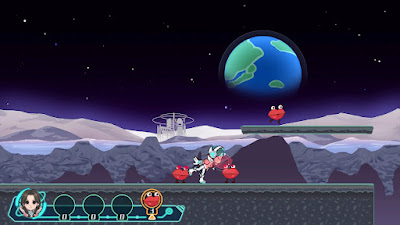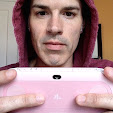If you've ever dreamt of playing an old-school action-platformer that has you kiss enemies rather than jump on or otherwise attack them, Uchu Shinshuchu may be the game for you. Or it may not be, as even after conquering 25 of its 51 stages I'm still teetering on the fence as to whether I like or loathe this digital Nintendo Switch title.
My main issue with Uchu Shinshuchu, which tasks players with saving the world from an alien invasion using the power of their puckered lips, is that you have to get really close to an enemy to kiss it. That would be fine if the game provided its protagonist (named Saturday-Chan) a life or health bar and flubbing a kiss resulted in damage rather than death, but it doesn't. As such, you die when you lean in to kiss an enemy but instead miss and run into it.
 |
| Uchu Shinshuchu's start screen |
That said, I've come to (mostly) appreciate this mechanic. It's strangely... fitting? You generally need to be bold to kiss someone, after all. Well, boldness is required to succeed at Uchu Shinshuchu, too.
A second issue with Uchu Shinshuchu, which may be even more damning than the first one, is that there's no backtracking. If you get stuck on a particular stage, you need to beat it or start over from the very beginning of the game.
 |
| Uchu Shinshuchu's story is as wacky as its gameplay |
That hasn't proven to be a huge problem for me yet, but what has proven to be a problem is getting stuck during a boss encounter. I'm currently on the game's fifth boss and having a devil of a time defeating him. So, I can either keep trying or give up.
On a related note, another of Uchu Shinshuchu's unique gameplay components has you "befriend" (for lack of a better word) all enemies you kiss. You can toss these so-called frenemies at their comrades to stun them, which then makes them easier to kiss and befriend.
 |
| Yes, you kiss enemies into submission in Uchu Shinshuchu |
That's cool and at least somewhat useful during the game's regular stages. It's nearly useless during boss fights, though, as if you don't defeat a boss on your first try (and if anything you're like me, you won't), you can't make use of these tossable frenemies. Why? Because you lose your cache of captivated frenemies when you die.
As a result, you usually have to tackle Uchu Shinshuchu's bosses solo. Considering how close you need to get to kiss them, this can be a frustrating challenge. I have a feeling a lot of folks will quickly give up on the game because of this alone.
 |
| You'll see this message a lot while playing Uchu Shinshuchu |
Which is too bad, as I otherwise like Uchu Shinshuchu quite a bit. Although I found the kissing "attack" off-putting at first, it's since grown on me to the point that I now view it as a pretty novel addition to the often-staid platformer genre. Also, the game has a nice, if simple, look to it and a peppy soundtrack that recalls similar offerings of yesteryear (think Mega Man and the like). It helps, of course, that I don't mind dying over and over and over again. On the contrary, it usually cracks me up. If it's likely to drive you mad, you should probably give the game a pass.
Speaking of buying or passing on Uchu Shinshuchu: I paid $2 for it. The game usually goes for $8. I wouldn't recommend buying it at full price. I'm fine with having spent $2 on it, but I doubt I'd be as happy if I'd spent $8.









